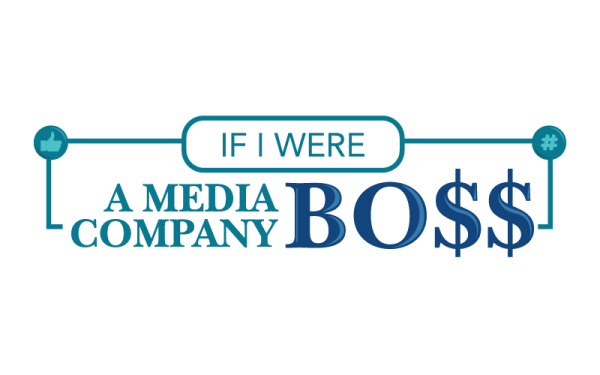
If I Were a Media Company Boss
What kinds of movies, TV shows, music, books and social media platforms would you create if you were the owner of a major media company? Let your imagination run wild as you think about what kind of media you would create for people. To get ideas, check out the reflections by other people below. Then, keep scrolling down to get the answers to your common questions about why there are so few media companies making almost all of the media you consume!
Media Boss Reflection Stories
See what other people envision:
FAQs

BILLION-DOLLAR CORPORATIONS
Who owns the media that you watch, play, listen to and read?
The number of independently-owned media companies in the United States and globally continues to shrink. Big companies get bigger by purchasing smaller companies. The result is that just one giant corporation, such as The Walt Disney Corporation, owns and operates MANY companies in television and radio production, distribution and broadcasting stations, direct-to-consumer services, amusement parks, and hotels.
Many rankings of the world’s largest media companies differ slightly. Some include Apple as a media company, but other listings rank it as a technology company. Some rankings figure the earnings and worth of each corporation differently.

HUNGRY MEDIA GIANTS
What’s the deal with all the big companies getting bigger by gobbling up smaller companies?
There used to be about 50 media companies in the United States in the 1950s. Now just a handful of U.S.-based massive media corporations create the vast majority of the world’s media programs, from TV shows to movies to advertising to broadcast news to digital media and more!
Buyouts (a bigger company buying a smaller company) and mergers (two big companies joining in all or in part) have expanded the size of already big media giants. Consolidation is the word to describe the joining of media companies into one massive company that is then called a conglomerate.

WHY SHOULD I CARE?
Why should you care about who owns the media you use?
You spend money, time and attention with media every day. You deserve to know what kind of company is profiting from you.
Here is an example: You spend money to get streaming TV services. You also spend your attention, giving it to advertisers who broadcast commercials during programs. Your time with that media is tracked. The more people and the more time those people spend on the streaming service, the more the owner of that service can charge advertisers to place a commercial. Where you put your time and attention matters! Put it toward not only media you want more of, but also corporations that are acting in society and in our world in ways that you support and believe in.


IS BIG MEDIA GOOD OR BAD?
Is it good or bad that media companies are joining together?
It depends on your point of view.
Some people think that bigger corporations offer lots of variety because they are so huge that they can risk doing unusual or offbeat programming and not have to worry about going out of business if audiences don’t like a particular show. This point of view is that the more media outlets there are, the greater the variety of media you can choose from.
Other people think that bigger corporations reduce the variety of media we get because these media giants only care about profits, not about diversity of content. A money-making formula such as the Marvel franchise won’t get changed much, because it’s profitable. Notice how many top-10 movies each year are sequels! Smaller production companies and independent film makers can’t get noticed by media giants and so the important stories they tell get lost.

AREN’T YOU FORGETTING SOME MAJOR PLAYERS?
Are technology companies such as Google, YouTube, Meta, Microsoft and Amazon considered media companies too?
Good question! So far, in the United States, they are not. While tech companies provide media content – You Tube shares videos that people make and Facebook shares photos and posts by people – they are not considered media companies—yet. There’s a lot of discussion going on in political, business and legal circles about whether tech companies are actually creating media and should be considered media companies under U.S. law.

SO WHAT IF TECH COMPANIES AREN’T MEDIA COMPANIES?
Who cares if a company is considered a media company or a tech company? So what?
In the legal system in the United States, internet service providers, search engines and social media platforms have only very limited responsibility for content that users create but that the companies host and circulate. A tech company has doesn’t have to do much under the law to prevent the circulation of hate speech on its platform. And these tech companies can collect and sell data about users quite freely. All of these things are not true to the same degree for media companies.

![[Disclaimer: grammar left as authors intended] A kitchen witch cooking show? Magical recipes for the everyday witch](https://www.wondermedialibrary.com/wp-content/uploads/2023/11/Media-Boss-Card_72236970748-788x1024.webp)
![[Disclaimer: grammar left as authors intended] Soopr cats](https://www.wondermedialibrary.com/wp-content/uploads/2023/11/Media-Boss-Card_72236971984-788x1024.webp)
![[Disclaimer: grammar left as authors intended] Programming Peace - Emphasis on cooperation, understanding, non - violent conflict resolution ALSO - How about chose your own adventure interactive programs to engage people?](https://www.wondermedialibrary.com/wp-content/uploads/2023/11/Media-Boss-Card_72236948697-788x1024.webp)
![[Disclaimer: grammar left as authors intended] I would create a love story](https://www.wondermedialibrary.com/wp-content/uploads/2023/11/Media-Boss-Card_72236966703-788x1024.webp)
![[Disclaimer: grammar left as authors intended] America First Values No sensorship No favortism No payoffs Equality - Definitly the opposite of CNN MSNBC & others who favor the democractic posititions of Globalism](https://www.wondermedialibrary.com/wp-content/uploads/2023/11/Media-Boss-Card_72236952058-788x1024.webp)
![[Disclaimer: grammar left as authors intended] Increased Korean dramas & movies in US - lots of shows that reflect popular American shows but arent given a chance since in another lang - maybe …. Availability of subtitles … for movies in theaters](https://www.wondermedialibrary.com/wp-content/uploads/2023/11/Media-Boss-Card_IMG_5137-788x1024.webp)
![[Disclaimer: grammar left as authors intended] 1 (Film Major here) Film about a young mixed girl trying to find her ethnic identity w/ her family & peers. 2 Mixed babies never exist, usually mixed black & white, nothing else PEOPLE ARE NOT JUST BLACK AND WHITE!](https://www.wondermedialibrary.com/wp-content/uploads/2023/11/Media-Boss-Card_72237008111-788x1024.webp)
![[Disclaimer: grammar left as authors intended] My company would create more bio-pics/document-eries of influencial figures who progressed society but aren’t talked about enough I’d also re-new the “Amazing Race”!](https://www.wondermedialibrary.com/wp-content/uploads/2023/11/Media-Boss-Card_72236973590-788x1024.webp)
![[Disclaimer: grammar left as authors intended] I would want my company to be a womens only production crew. The LGBTQ+ community would be welcomed too!](https://www.wondermedialibrary.com/wp-content/uploads/2023/11/Media-Boss-Card_72236957482-788x1024.webp)